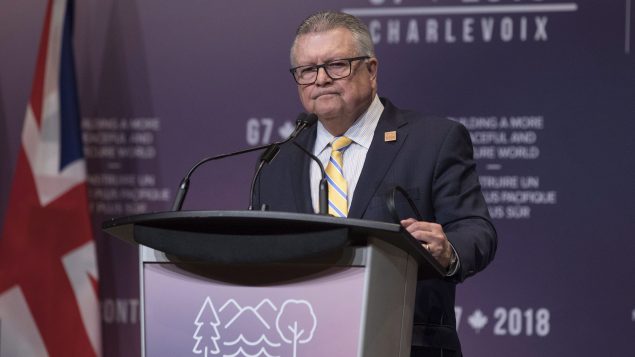A leading Canadian expert on genocide and human rights is calling on the federal government to prosecute Canadian jihadist fighters returning from Iraq and Syria, arguing Ottawa has a moral and legal duty to seek justice and uphold the rights of vulnerable minorities targeted by these extremists.
Kyle Matthews, executive director of the Montreal Institute of Genocide and Human Rights Studies (MIGS), says ISIS and other jihadist groups engaged in systematic mass atrocities against minorities in Iraq and Syria, including the Yazidi minority, Christians and Shiites.
“As a State Party to the Rome Statute of the International Criminal Court and a signatory of the Convention on the Prevention and Punishment of the Crime of Genocide, Canada has a responsibility to uphold these international legal conventions when formulating carefully crafted policy responses that deal with returning foreign fighters,” Matthews writes in a paper published by the Canadian Global Affairs Institute.
Canada should attempt to prosecute its nationals in domestic courts using the Crimes Against Humanity and War Crimes Act, Matthews writes in the paper titled Justice for the Victims: How Canada Should Manage Returning “Foreign Fighters”.
‘We’re really weakening the international system’
“One of the challenges that I see or, perhaps, the difficulties that our leaders have not anticipated is that by allowing them to return and not trying to prosecute them, not trying to hold them to account for the collective crimes of the group, which are well-known, including the crime of genocide, we’re really weakening the international system, we’re weakening the message to future Canadian citizens that might want to do the same,” Matthews said in a telephone interview with Radio Canada International.
“And we’re also not upholding our international moral and legal requirement to punish people for the crimes of genocide.”
ListenOpen trials can serve as means to help counter violent extremism and future atrocities, he said.
Prosecuting returning foreign fighters can also serve as a deterrent and warning to other Canadians who might try to join ISIS as it mutates and moves to other countries in the world, such as Libya, Afghanistan, Egypt, the Philippines, Pakistan, or in Mali where Canadian peacekeepers have recently been deployed, Matthews said.
“The government has not charged anyone with the crime of genocide and I think they need to seriously consider that,” Matthews said.
Instead the government of Prime Minister Justin Trudeau has adopted a policy “focused on monitoring returning fighters and helping them to reintegrate, when possible, into Canadian society,” Matthews said, citing a quote attributed to Public Security Minister Ralph Goodale.
Charges laid in two cases

Canada’s Minister of Public Safety Ralph Goodale addresses the media during a press briefing in Toronto on Monday, April 23, 2018. (Chris Young/THE CANADIAN PRESS)
Scott Bardsley, Goodale’s spokesperson, said the quote attributed to the minister of public security was in fact an inaccurate paraphrase of Goodale’s remarks made on Nov. 17, 2017.
In his remarks at the time Goodale said that “Canada does not engage in death squads or assassination plots” to deal with the threat posed by the possible return of Canadian jihadists from Iraq and Syria.
“We work very hard using the tools of law and international cooperation and collaboration to make sure we keep Canadians safe,” Goodale said.
“Canadians can be assured that their security and intelligence and police organizations are doing everything that can possibly be done to keep Canadians safe and to respect the rights and freedoms of Canadians.”
Bardsley said Canadian law enforcement agencies actively pursue investigations and lay charges when there is evidence to support them.
“Two returned foreign fighters been charged since we took office, and none were charged under the previous government,” Bardsley said.
There are just over 190 extremists with a nexus to Canada who are abroad and who are suspected of engaging in terrorist activity, Bardsley said.
In addition, the Government is aware of approximately 60 individuals who have returned to Canada, he added.
When there are challenges in converting intelligence to evidence usable in court, a full range of counter-terrorism tools are used, Bardsley said.
These measures include investigations, surveillance and monitoring; intelligence gathering and lawful information sharing; peace bonds; no-fly lists; revocation of passports; and legally authorized threat reduction measures, he said.
The suite of measures that will be used in response to any particular individual or situation is determined by the Royal Canadian Mounted Police (RCMP), Canada’s national police force, and the Canadian Security Intelligence Service (CSIS), the domestic intelligence agency, and other expert authorities, Bardsley said.
“The issue of extremist travellers is one that we are dealing with along with our allies, and was part of the discussions at the G7 meeting of security ministers in Toronto,” Bardsley said. “We committed to working together, and with our partners in the region, to ensure that information collected in conflict zones can be used for the prosecution of terrorism-related offences.”







For reasons beyond our control, and for an undetermined period of time, our comment section is now closed. However, our social networks remain open to your contributions.